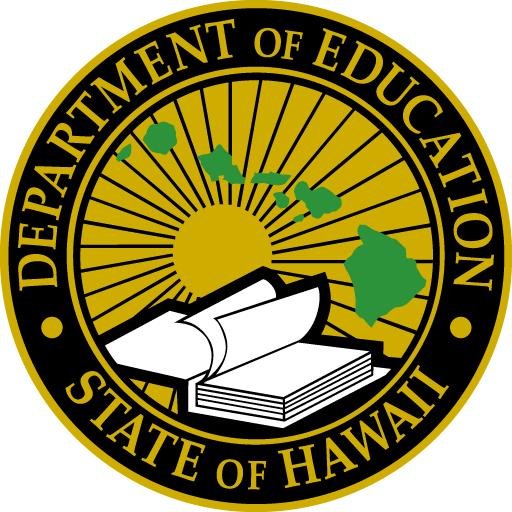E ola pono. E mālama i nā piko.
Live pono. Nurture thriving connections.
While the primary focus of health education is the development of health skills, these skills must be addressed in conjunction with functional information in the context of priority risk topics. Standards-based health education must be age and developmentally appropriate, medically accurate and provide factual information in all priority risk topics:
- Mental and emotional health
- Healthy eating and physical activity
- Personal health and wellness
- 安全性(不慮の事故防止)
- 暴力防止
- 喫煙防止
- アルコールおよびその他の薬物使用の防止
- Sexual health and responsibility
注記: 健康教育 in prekindergarten is aligned to the ハワイの早期学習および発達基準 (HELDS).
コースの要件
- 健康教育 is required in all elementary grades.
- Middle/intermediate schools must offer courses that allow all students to meet Hawaiʻi՚s health education standards and performance indicators for grades 6-8. One semester (0.5 credits; 60 hours) of health education in each middle/intermediate school grade is strongly recommended but not required.
- In high school, a one semester course (0.5 credits; 60 hours) in health education is required for graduation.
- A variety of health specialized elective courses (e.g., peer education) are available at the secondary school level.
- 中学校への進級および高校卒業要件については、 理事会方針 105-1 学術プログラム (PDF), Board Policy 102-9 Middle Level 教育 Promotion Policy (PDF)、 そして 理事会方針 102-15 高校卒業要件および卒業式 (PDF).
wellness guidelines for 健康教育
Comprehensive health education provides the instructional foundation that prepares students to build healthy relationships and make lifelong healthy decisions. The 健康ガイドライン support quality health education grounded in Hawaiʻi.
The wellness guidelines for health education are organized around 3つの主要コンポーネント that address instructional minutes, include nutrition education, and emphasize culturally relevant and ʻāina-based approaches:
- Instructional content of health education classes includes a focus on knowledge and skills that support healthy eating and is aligned with the HIDOE standards for health education.
- 健康教育 is provided to students in elementary grades at least 45 minutes per week and secondary grades at least 200 minutes per week.
- Nutrition education includes culturally relevant activities that are ʻāina-based and hands-on, such as food preparation, taste-testing, farm visits and school gardens.
Sexual 健康教育
Comprehensive sexual health education helps students understand and navigate their development and growth as they progress from childhood through puberty and adolescence. Effective, comprehensive sexual health education provides students with the age-appropriate, medically accurate content and skills to know and be able to communicate for healthy relationships, access resources and support, and make healthy decisions.
Several state laws and policies help prevent teen pregnancy and the spread of sexually transmitted infections through comprehensive sexual health education.
- 州法 (Hawaiʻi Revised Statutes (HRS) §321-11.1) establishes requirements for any state-funded sexual health education program.
- Board Policy 103-5 Sexual 健康教育 (PDF) requires the Department to implement comprehensive sexual health education.
- 学校が使用するカリキュラムの説明は、保護者/法定後見人に公開され、指導開始前に学校のウェブサイトに掲載されるものとします。
- A student shall be excused from sexual health instruction only upon the prior written request of the student’s parent or legal guardian.
- 学生の親または法定後見人が書面による要求を行った場合、学生は懲戒処分、学業上の罰則、またはその他の制裁の対象とならない場合があります。
Parents or legal guardians can also opt-out of having their children participate in instruction related to controversial issues.
親または法定後見人は、学校管理者または教師に手紙を書いて、特定の授業または活動から子供を除外することができます。そのような手紙を受け取った場合、生徒には代わりの学習活動が提供されなければなりません。親または法定後見人は、授業または活動の前に学校管理者または教師に通知する義務があります。
Recommended instructional materials:
- FLASH (PDF)
- Get Real (PDF)
- HealthSmart (PDF)
- Pono Choices (PDF)
- Positive Prevention PLUS (PDF)
- Reducing the Risk with the Supplement (PDF)
- Rights, Respect, Responsibility (PDF)
Learn more about Sexual 健康教育 in the HIDOE (PDF)
Sexual Violence Prevention 教育
Teaching students about sexual violence prevention is essential for nurturing safe and caring schools and communities. It equips students with information and skills that promote healthy relationships and respect for others. It also helps students understand how to seek support if they or someone they know experiences sexual violence.
Prevention-oriented and developmentally-appropriate sexual violence prevention instruction to students addresses:
- bodily autonomy (e.g., body awareness and safety, consent, boundaries),
- recognizing and reporting sexual abuse, and
- accessible resources (e.g., trusted adults, community resources).
Department schools will be responsible for providing a description of the curriculum on their public-facing websites. Before the start of instruction to students, schools will notify parents and legal guardians about the upcoming instruction, how to preview the school’s materials, and the opt-out process.
A student shall be excused from sexual violence prevention instruction only upon the prior written request of the student’s parent or legal guardian. A student may not be subject to disciplinary action, academic penalty, or other sanctions if the student’s parent or legal guardian makes a written request.
Approved instructional materials:
- Elevatus Training Curriculum: Sexuality 教育 for People with Developmental Disabilities, Adapted for People with High Support Learning Needs (PDF)
- Fight Child Abuse (PDF)
- HealthSmart (PDF)
- Mad Hatter Wellness Curricula (PDF)
- NetSmartz (PDF)
- Positive Prevention PLUS, Special Populations (PDF)
- Rights, Respect, Responsibility (PDF)
- Second Step Child Protection Unit (PDF)
- The Sex Abuse Treatment Center’s Sexual Abuse Prevention Curricula (PDF)
Learn more about Sexual Violence Prevention in HIDOE.
general health education リソース
- Why 健康教育 Matters (Google Doc)
- 健康教育 Standards and Topics Overview (Google Doc)
- Learning Design for 健康
- 健康教育 Printables (Google Drive)
- ウェルネスガイドライン
- You Matter! 健康 リソース
- Using School Gardens in 健康教育
- Reviewing Instructional Materials for 健康教育 (PDF)
- 2022 Hawaiʻi School 健康 Profiles – Highlights Report (PDF)
USDA 差別禁止声明
連邦公民権法および米国農務省 (USDA) の公民権規制と方針に従い、この機関は、人種、肌の色、国籍、性別 (性自認と性的指向を含む)、障害、年齢、または過去の公民権活動に対する報復や報復に基づいて差別することを禁止します。
プログラム情報は英語以外の言語で提供される場合があります。プログラム情報を入手するために代替のコミュニケーション手段(点字、拡大印刷、オーディオテープ、アメリカ手話など)を必要とする障害のある方は、プログラムを管理する州または地方の担当機関、または USDA の TARGET センター(202)720-2600(音声および TTY)に連絡するか、連邦リレー サービス(800)877-8339 を通じて USDA に連絡してください。
プログラム差別苦情を申し立てるには、申立人は、次の場所からオンラインで入手できる AD-3027 フォーム (USDA プログラム差別苦情フォーム) に記入する必要があります。 https://www.usda.gov/sites/default/files/documents/USDA-OASCR%20P-Complaint-Form-0508-0002-508-11-28-17Fax2Mail.pdf、USDA のどのオフィスからでも、(866) 632-9992 に電話するか、USDA 宛てに手紙を書くことで、苦情を申し立てることができます。手紙には、苦情申立人の名前、住所、電話番号、および公民権侵害の性質と日付を公民権担当次官補 (ASCR) に通知するのに十分な詳細を記載した差別行為の記述を含める必要があります。記入済みの AD-3027 フォームまたは手紙は、次の方法で USDA に提出する必要があります。
- 郵便:
米国農務省
公民権担当次官室
1400 インディペンデンス アベニュー、SW
ワシントン DC 20250-9410; または - ファックス:
(833)256-1665または(202)690-7442;または - メールアドレス:
プログラム
この機関は機会均等の提供者です。

